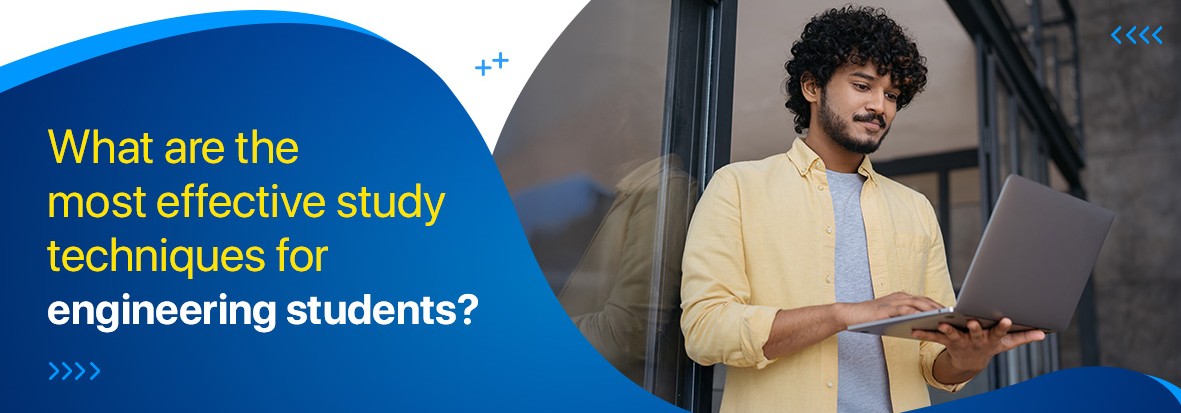What are the most effective study techniques for engineering students?
Engineering students in India face one of the toughest academic journeys. The curriculum moves quickly, the content is highly technical, and competition in top colleges is intense. Success requires more than long hours of study—it requires strategic methods that sharpen understanding, improve retention, and make learning more efficient.
The challenge lies in finding techniques that balance traditional study habits with modern tools such as online platforms. By approaching study with focus and structure, students can handle demanding coursework, excel in exams, and gain the practical skills their profession demands.
Here are effective, proven strategies to help engineering students make the most of their time and effort.
1. Engage Actively, Don’t Study Passively
Reading through notes or watching lectures without interaction is rarely enough. Active learning—direct engagement with material—is the key to mastering complex subjects. Solving problems independently, asking questions, or explaining a concept to peers forces the mind to work harder and strengthens understanding.
For example, in mathematics or mechanics, attempting problems without looking at the solutions builds real confidence. Techniques such as retrieval practice (testing knowledge from memory) and self-quizzing ensure that information is retained far more effectively than through repeated reading.
2. Break Complex Topics into Clear Segments
Engineering subjects often appear overwhelming due to their depth and scale. A reliable method to manage this complexity is chunking—dividing larger topics into smaller, manageable sections. For instance, thermodynamics: instead of tackling it as one vast subject, divide it into laws of thermodynamics, entropy, and heat engines.
Focus on one area at a time before moving to the next. This structured approach prevents overload, creates a sense of progress, and helps students approach even the most technical content with clarity. Many online education platforms apply this same principle with topic-based lessons.
3. Apply Spaced Repetition for Long-Term Memory
Engineering knowledge builds over years, not weeks, so memory techniques are essential. Spaced repetition is one of the most effective methods for long-term retention. By revisiting material at carefully increasing intervals, students reinforce learning without the pressure of cramming. This technique works particularly well for subjects requiring strong conceptual foundations, such as control systems or structural analysis.
4. Use Previous Question Papers Strategically
Preparation for exams should always include practice with previous years’ question papers. These papers reveal recurring patterns, question styles, and marking schemes. More importantly, they help students manage their time during actual examinations.
Timed practice builds stamina and discipline. After each attempt, reviewing errors is vital: identifying weak areas allows targeted revision, while repeated exposure to exam-style problems reduces anxiety. Leading and trusted online platforms such as ours offer easy access to extensive question banks, making this technique accessible to all students.
5. Strengthen Learning Through Group Study
Collaboration remains one of the strongest methods to deepen understanding. In group study sessions, students can explain concepts, challenge one another, and exchange methods of problem-solving. Explaining an idea to peers not only helps others but also consolidates the speaker’s own knowledge.
However, group study must remain focused. Assign specific topics to each participant to avoid wasted time. For example, in a civil engineering group, one student might cover structural analysis while another presents on material properties. This structured collaboration mirrors teamwork in professional engineering projects and ensures efficient progress.
6. Track Progress with Regular Assessments
Self-assessment provides a realistic measure of progress and identifies areas needing improvement. Quizzes, mock tests, and online practice modules allow students to evaluate their knowledge consistently rather than waiting until the final exam.
Feedback is crucial in this process. Many e-learning platforms now provide detailed analytics that highlight strengths and weaknesses. By using these insights, students can adjust their study plans and focus efforts on weaker areas, ensuring steady improvement.
Looking for trusted online education platforms for engineering students?
Our e-learning portal is designed to support engineering students with comprehensive, interactive, and easily accessible learning resources. We cover all major engineering disciplines, which include mechanical, electrical, electronics, IT, civil engineering and computer science.
We enforce concepts contextually and conceptually, which helps students build a strong foundation and achieve impactful academic progress. Furthermore, our application-oriented courses are crafted by top academicians and subject matter experts.
Once you register with us, you will be provided with uninterrupted access to:
- Engaging video tutorials based on your syllabus
- Question banks to help you self-evaluate
- Live chat to help you understand complex concepts
- Ask a Doubt, a feature that you can use to clarify your doubts whenever you need
With a vast library of over 50K+ learning videos, our platform aims to help engineering students master theoretical and practical concepts at their own pace.








